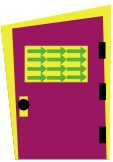Serendip is an independent site partnering with faculty at multiple colleges and universities around the world. Happy exploring!
The Three Doors of Serendip: Hands on Understanding
|
The Three Doors of Serendip: Hands on Understanding
|
Door images from Woodstone |
Feeling playful? And never heard of the "Monty Hall Dilemma" or the "Let's Make a Deal Game" or the "Three Door Problem"? Or at least never played them or thought about them much? Good, then let's play.
Here's the outline of the Three Doors of Serendip game: There are (of course) three doors, and Serendip will randomly put $5 behind one of them. You then get to guess which of the doors the money is behind. Before looking to see whether you're right, though, Serendip (which knows where the money is) will open a different door and show you that the money is NOT there. Now comes the critical part of the game. You have to decide whether to stay with the door you originally chose or switch your choice to the remaining, as yet unopened door. If you're right, you'll get the $5. If you're wrong, you'll LOSE $5. In either case, you get to play again... and again and again. Don't worry if you lose now and then, maybe even a lot at the beginning. There IS a way to come out ahead in this game. All you have to do is find how.
Your goal is to earn $40 dollars and there is a plot and monitor to track your winnings. If you think you know how to do it before you actually get there, there's a little button (called "I've got it!") to push that tells Serendip that you think you know. Push it, but then keep playing to prove to Serendip that you can actually get to $40. When you get there, Serendip will show you how you did.
Don't think about it, just start playing. But try and get to $40 as fast as you can, and be sure to let Serendip know as soon as you think you know how to do it (but not before; remember that you have to keep playing and Serendip will find out whether you were right). Good luck. To start playing, click on the door below. The applet will launch in a new window which also includes detailed instructions for playing the game. Have fun.
What can you do with your results? Well, you can see how long it took you to get to $40 dollars, and compare that with your friends (feel free to share your results using the forum below). Longer for some people, shorter for others? Wonder why? Are there any other differences between people that take longer and people who take less long that might explain it? Make up a hypothesis and test it out by getting some more people to play. How about how long it took before you were sure you could get to $40? Was that the same or different for different people? How come? How could you test that hypothesis?
There is something else perhaps even more interesting about this game, and your experiences with it. It's something that helps to "understand understanding". You got to $40 but you may or may not be able to say how you did it. And even if you think you can say how you did it, you may find by looking at your results that you actually started improving before you thought you knew how to. To put it differently, your discovery of how to play the game didn't result from "thinking" about it but rather from just doing it. And your knowledge of how to play the game may still be largely "unconscious" knowledge. You may find yourself winning without knowing how you're doing it (the knowledge is "unconscious"). And then subsequently you may have a feeling or intuition ("intuitive" knowledge) about what to do, but not be able to justify it to yourself or anyone else.
|
If you want to think more about unconscious and intuitive knowledge, go here. Otherwise, let's explore how reliable unconscious understanding is, and how to further develop it (Door 2, Experimental Understanding). |
||
 Hands on understanding |
Experimental understanding |
Broader understanding |





Comments
Post new comment